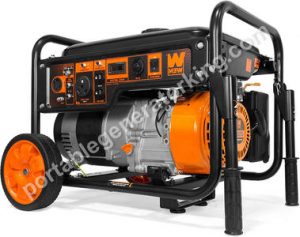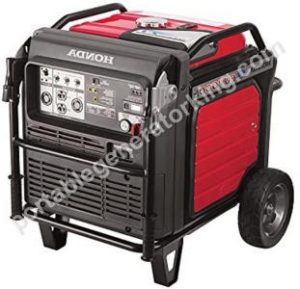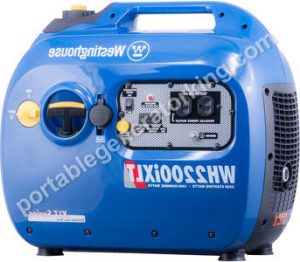The portable generators we have today allow for usage in almost any type of environment. The best models on the market come with a dual voltage AC inverter, an exclusive Honda fuel tank design and a dependable Yamaha engine that makes it easy to provide power during emergencies, natural disasters or for portable home use. One thing worth mentioning is that half-horsepower (500 watts) generators are also available.
How Do I Choose The Best Gas-Powered Generator?
We all know that natural disasters can happen at any time. You’re only a step away from having to survive without the comforts of your home. Most people don’t like hearing those words, but this is the reality we are talking about and making preparations for it should be one of your current focuses. We’ll start by recommending a generator that can be used during times of need, as well as an alternative power source in case some disaster, will occur and your home won’t have electricity for several days, weeks or even months.
You know you don’t want to lose the food in your freezer or refrigerator. You also want to make sure that you have access to water, both in your bathtub and kitchen sink and most importantly, uninterrupted access to light during nighttime hours. A portable generator offers all those things along with more benefits which we’ll bring up shortly. Continue reading below to learn our list of the Top 3 Best Gas-Powered Generators available on the market today!
Gas-powered generators operate from gasoline or diesel fuel stored on site. They’re attached to the outside of your home by running an extension cord to reach a power outlet. They’re one of the most reliable sources for emergency backup power, and they eliminate the need for costly installation work or long-distance extension cords.
Sizing a Generator Correctly
Before choosing a portable generator, you’ll have to measure the electrical load of your house and determine how much power you need it to supply. After that, you should calculate the wattage provided by your backup generator.
If you are looking for a backup solution for your home (not for emergencies) then you can opt for a smaller generator which costs less money than bigger ones, but their purpose is limited because they don’t deliver enough power to run multiple appliances at once as bigger models do. Also, keep in mind that some states limit the number of hours per week when generators can be operated. These limitations usually apply during winter time, when heating loads – and thus electricity usage increases significantly.
Best Gas Generator

When there’s no power and you need it the most, get reliable devices like this 6kW WEN generator to power all your essentials. Compatible with a variety of voltage configurations, this generator features a 3.4-gallon fuel tank that runs up to 7 hours at half load depending on ambient temperature and power output, 28 pounds of shipping weight for convenient carrying and easy portability without ever leaving you stranded.
Visually take away from the stresses f being in an emergency situation or even just traveling as many achieve peace-of-mind knowing their electricity will go wherever they are going with the convenience of wheels included on our gas-powered portable generators.; delightfully compact design combined with wheel kit maximizes portability; sports comfortable handles and a quiet muffler for less noise while in operation; single pull starts with instant electric start producing up to 6,000 watts of power for multiple devices and appliances.

The Honda 5500/7000-Watt EU7000is has the ability to store enough fuel for up to 11 hours of use. With its super quiet engine, this generator is perfect for backup power at home and in the field. For safety reasons, when it detects that oil is too low or if someone improperly uses a petrol-type additive while refueling it shuts off automatically. It’s time you invested in a reliable standby generator from Honda!
Worries about snowstorms, downed power lines, plumbing emergencies? No problem! The Honda 5500/7000-watt EU7000is will provide nine hours of continuous service with the powered equipment needed thanks to 130 amps of starting power and 920 max watts. After ninety minutes of operation, the Quiet-Test™ electronic throttle control system quietly throttles down the output to prevent over-taxing the engine, automatically bringing the power back up if needed. This is a whole house generator with enough power to run two fridges and a freezer at once! It can even run your washer or dishwasher and it comes with wheels for easy transportation from one location to another. As of now, this is the best gas-powered generator available on Amazon today – so you know that’s saying something!

Westinghouse WH2200iXLT is an 1800 rated watt, 2200 peak watt generator for indoor use. Weighs only 43 pounds and can run all your home essentials in the event of a power outage. It features a very quiet 52 dBA noise output and a 13 hour run time on 1.3 gallons gas tank with Economy Mode for fuel-efficiency. Parallel capable so it can be combined with other Westinghouse generators to increase available wattage and amperage (requires parallel cord). Also compatible with iGen120 so you can enjoy clean electricity as well as outdoor usage when you need it most!
Buying Options
2-cylinder gas models – are often used for construction sites while 4-cycle models – are more common around households. They both have their advantages depending on what you need them for. The most popular portable generators on the market are 2-cycle models. They’re affordable and lightweight so they won’t cost you too much to use them for backup power purposes, or simply for recreational activities. These machines are also easier to maintain because of their 1-piece engine design and as a result, it costs less money out of your pocket in the long run. However, if you want the added benefits of more power and longer running times, 4-cycle models are definitely worth checking out!
Keep an eye on the wattage capacity of the generator
When choosing the best gas generator for your needs, it is important to keep track of the wattage capacity. You’ll want to know how much juice (measured in watts) each unit can produce – especially if you’re planning on using them regularly around your home. Keep in mind that a higher wattage allows units to power more appliances at once and they will work with less strain on their engine. This means that they have a longer working life! As you probably know, the amount of watts an appliance uses determines whether or not it’s suitable for backup purposes – so if you have a lot of devices running around your house, be sure to get something with enough power output! Running Time Many customers consider running time as being one of the most important factors when it comes to choosing a portable gas-powered generator. The more time these machines can keep their engines running, the less you’ll have to worry about your devices draining power out of them while they’re in use! To put this into perspective – Honda’s portables are one of the best choices if you want quality over quantity. Models like the EU1000i and EU2000i only produce 1000 and 2000 watts respectively, but they can run for up to 12 hours on a single tank full! This is why we highly recommend checking out its product line if you’re looking for something with long-lasting capabilities.
Generator Safety
During times of power outages/emergencies, safety has to become one of your priorities – regardless of what you’re doing. Portable gas-powered generators are as safe as they get during this type of situation because they don’t require any installation work before being used. Just fill them with fuel and plug them into a wall socket near where you need power. That said, we recommend reading these 5 tips for using portable gas generators safely and efficiently:
- Run the machine for short periods of time only – Running your generator constantly will result in it overheating, which can lead to an accident or fire. Try to run it for just a few minutes at a time, depending on how much power you need. For example, if you’re powering up your refrigerator, allow the machine to run for no longer than 10-15 minutes before turning it off to let it cool down for 30 minutes or so. You can then turn the generator back on and do this two more times throughout the day. This way you’ll give your backup power source enough rest time between uses in order to prevent running into any serious problems later on!
- Don’t connect the generator to your house’s electrical system – This is one of the most common mistakes people make when running a generator. The last thing you want to do is hooking it up to your home’s main source of electricity! Doing so can result in electrocution or starting an electrical fire, which will cause a lot more damage than a power outage ever could. If you’re using portable gas generators for emergency backup purposes, look for models that come with inverter technology. These machines are specifically designed for load sharing applications and they transform direct current (DC) electricity into alternating current (AC), which they then distribute via household outlets just like regular utility wires would. If you need extra stability while using this type of equipment, attach surge protectors in-between the generator and your devices to help regulate voltage levels.
- Check that all gas/vent/water connections are firmly in place – These types of accidents can occur as a result of negligent handling, which is why it’s important to pay attention when connecting and disconnecting these components. Not only will you want to make sure they’re properly secured, but you’ll also want to make sure they’re not leaking fuel or water at any point (which would cause a fire).
- Use proper safety equipment while running your generator – Regardless of how many years of experience you have with operating generators, we highly suggest wearing protective gear like dust masks when using them. This type of mask will protect your lungs from dust particles triggered by the machine’s constant running and it will ensure your health is not jeopardized in the event of an accident.
- Don’t use a generator indoors – This is another thing you should never do while using portable gas-powered generators. Your best bet is to find an open space that has at least 3 feet (1 meter) of clear air around it for proper ventilation purposes. Be sure to check out our guide on how to choose a safe location for your unit if you’re not sure where you can place it outdoors!
Running Time
Portable gas generators generally range from about 500 to 7,000 Watts and can run for 4 or more hours on a full tank of gas. That’s the average running time you can expect from the Honda portable generator set shown above – 6,200 watts/8.2 amps @ 120VAC with a peak surge of 10,000 watts/16.5 amps @ 120VAC.
Running times are affected by several factors including: Load type (inductive loads like refrigerators should not be used), climate conditions and fuel quality (low octane gasoline or diesel fuel will reduce your engine’s performance).
Control Panel Features
Generators usually come with a power control panel where you can set up the timing for automatic start and shut down, run time types (continuous or ignition controlled) and wattage output. Most models on the market also have an electric coil to automatically restart your generator after utility power is restored. These features are all included in your best gas-powered generators review below!
The control panel is the main user interface of your generator. It’s where you should find several useful indicators that will tell you how to run the machine safely and efficiently.
Amp/hour meter – displays how long you can operate each load, including electrical (lightning) loads, heating loads, etc. kWh meter – measures total energy use in kilowatt hours over a period of time you pre-select from the settings on the generator
Frequently Asked Questions
Conclusion
The most important thing you can do is take some time to plan exactly what your generator will be used for before purchasing one. Make sure you don’t overdo it! Too much power can damage certain appliances or worse yet, the wiring in your house. So take some time and make sure everything is thoroughly thought out before investing a lot of money into this big purchase.